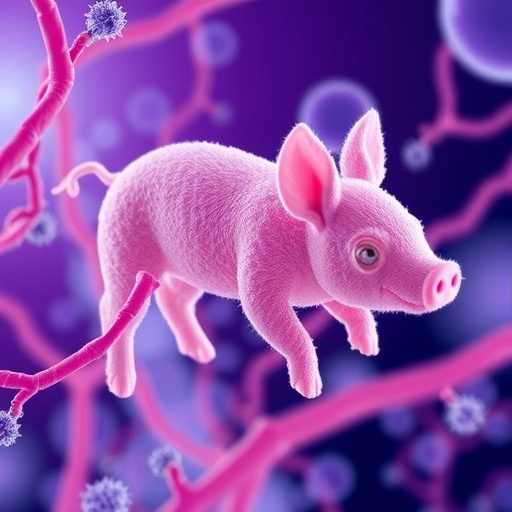Recent studies have brought to light the alarming impacts of microplastics in our environment, with a specific focus on how these tiny particles can infiltrate biological systems. In a groundbreaking paper published in Scientific Reports, researchers led by Mierzejewski and colleagues delve into the effects of ingested polyethylene terephthalate (PET) microplastics on the porcine pancreas. Their findings reveal significant alterations in the metabolomic profiles of these animals, raising questions about the potential consequences for both animal and human health.
Microplastics, defined as plastic particles smaller than 5mm, have become ubiquitous in our ecosystems, primarily due to plastic waste pollution. These particles originate from various sources, including the degradation of larger plastic items, industrial processes, and even cosmetic products. As these microplastics permeate every corner of the Earth, their presence in food chains is becoming a cause for concern, especially given their potential to interact with biological tissues in harmful ways.
The study conducted by Mierzejewski et al. is particularly pivotal in understanding the ramifications of microplastics because pigs share similarities in digestive physiology with humans. The researchers meticulously designed their experiments to evaluate how ingested PET microplastics influenced the metabolomic profile of the porcine pancreas. Their work not only illustrates the direct impact of these particles on animal health but also provides insightful implications for potential human exposure through the food chain.
Using high-resolution mass spectrometry, the researchers analyzed pancreatic tissue samples from pigs that had been exposed to PET microplastics. The results were striking; exposure significantly altered the levels of various metabolites in the pancreatic tissues analyzed. Such changes can have profound implications, considering the pancreas’s critical role in digestion and endocrine functions. The alterations observed in the metabolomic profile suggest that ingestion of microplastics can lead to disruptions in metabolic processes, potentially contributing to adverse health effects.
One of the most concerning findings of this research was the identification of specific metabolites that were either upregulated or downregulated in response to microplastic ingestion. Certain pathways associated with lipid metabolism appeared to be particularly affected. Disruptions in lipid metabolism can lead to a host of disorders, including obesity, diabetes, and cardiovascular diseases. Such findings underscore the need for more research into the long-term health effects of microplastics, especially as they pertain to metabolic disorders.
The potential pathway of microplastics from environmental sources into the human body highlights a disturbing susceptibility of both animals and humans to these pollutants. As pigs are often used as a model for human health studies, the results from this research raise the red flag about the implications of microplastic consumption. It prompts the question: how significant is the risk posed by microplastics in our diets? As the findings from Mierzejewski’s team demonstrate, it may well be a pressing issue needing immediate attention.
The study also emphasizes a growing body of evidence linking environmental pollutants to various health issues. The presence of microplastics in the food chain may exacerbate existing health disparities, especially in populations that consume high amounts of animal products. The increased prevalence of microplastics may have implications not just for metabolic health but potentially for other physiological systems such as immunity and hormonal regulation.
Moreover, the research findings fuel the ongoing debate regarding the safety and sustainability of our food systems. As the world grapples with plastic pollution, the ramifications of microplastics on wildlife, livestock, and ultimately humanity cannot be overlooked. Stakeholders, including policymakers, the agricultural sector, and environmentalists, must collaborate to find solutions to mitigate this burgeoning crisis.
With the mechanisms by which microplastics affect metabolic processes still under investigation, this research is a pivotal step toward broader inquiries into the consequences of microplastics on health. Further studies will be essential to decipher the long-term effects of their ingestion and the potential bioaccumulation of plastics in food products.
As public awareness about microplastic pollution grows, this kind of research becomes increasingly important. The scientific community must communicate these findings to the public effectively. This ensures that consumers are aware of the potential implications of their dietary choices related to animal products, particularly in terms of plastic contamination.
The findings of Mierzejewski and colleagues stand as a clarion call for further research, urging scientists to delve deeper into how microplastics interact with living organisms. It opens the door for future studies to explore a variety of microplastics and their unique effects on different metabolic pathways across a broad range of species.
In conclusion, the ingestion of PET microplastics resulting in significant changes to the porcine pancreatic metabolomic profile is an area that demands urgent further investigation. The implications for animal welfare, public health, and environmental sustainability are profound and multifaceted. As the body of evidence on microplastic contamination continues to expand, it is crucial for all stakeholders to engage in informed discussions about the risks and potential regulations that could mitigate these dangers.
Given the extent of plastic pollution and the complexity of biological interactions, comprehensive strategies and innovative solutions are required to tackle the issues posed by microplastics in our food systems and environment. Scientists, policymakers, and the public must work hand-in-hand to ensure a healthier future devoid of plastic contamination.
Subject of Research: Effects of ingested PET microplastics on the metabolomic profile of the porcine pancreas.
Article Title: Ingested PET microplastics alter the metabolomic profile of the porcine pancreas.
Article References:
Mierzejewski, K., Kurzyńska, A., Golubska, M. et al. Ingested PET microplastics alter the metabolomic profile of the porcine pancreas.
Sci Rep 15, 39227 (2025). https://doi.org/10.1038/s41598-025-21915-5
Image Credits: AI Generated
DOI: https://doi.org/10.1038/s41598-025-21915-5
Keywords: Microplastics, Porcine pancreas, Metabolomics, Health implications, Environmental sustainability.




